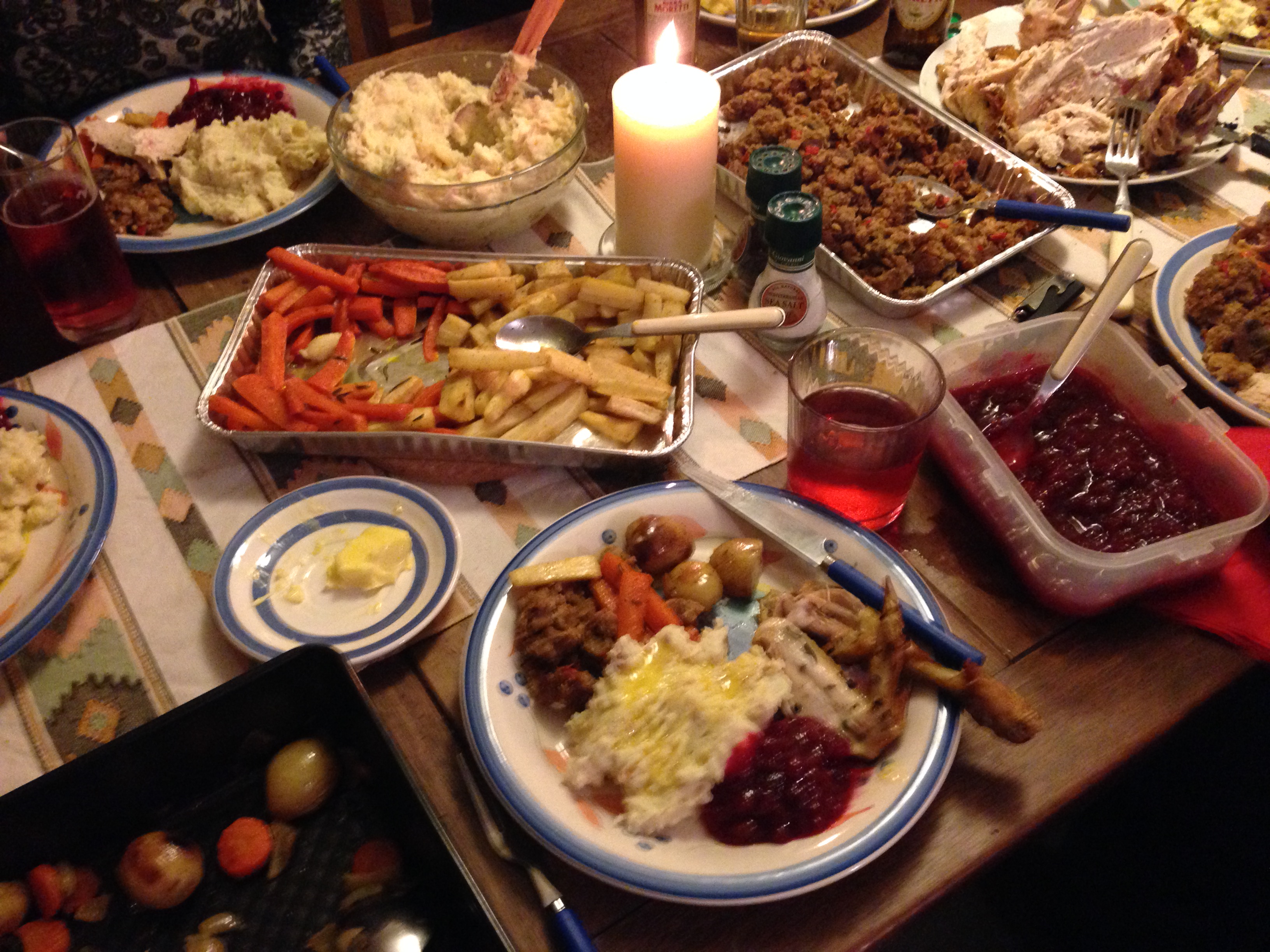As American As Pumpkin Pie: Thanksgiving in Cork
 If the current academic job market gets the better of me, I might just become a baker. Well, maybe not, but I do enjoy baking and there’s no better time to use it to procrastinate than Thanksgiving. Having lived in Cork for several years now, it’s become a tradition for a few American friends to get together for a potluck-style Thanksgiving dinner. We’ve adapted the standard practices somewhat: we hold it on a weekend, so that we have time off for cooking and recovery; some ‘traditional’ foods are left off the menu due to lack of ingredients; we don’t watch football; and we’re a group of friends, rather than family. But we always manage to have a good time and eat too much!
If the current academic job market gets the better of me, I might just become a baker. Well, maybe not, but I do enjoy baking and there’s no better time to use it to procrastinate than Thanksgiving. Having lived in Cork for several years now, it’s become a tradition for a few American friends to get together for a potluck-style Thanksgiving dinner. We’ve adapted the standard practices somewhat: we hold it on a weekend, so that we have time off for cooking and recovery; some ‘traditional’ foods are left off the menu due to lack of ingredients; we don’t watch football; and we’re a group of friends, rather than family. But we always manage to have a good time and eat too much!
Despite the changes, I think the holiday has a particular resonance for those of us living abroad. I’ve come to appreciate and enjoy Thanksgiving more living in Ireland than I did before, at least partly because like music – the subject of my research – the smells and tastes of familiar foods have a ‘visceral power’ to conjure up memories and ties to home and family.[1] Discussions with other Americans living in Ireland invariably turn to foods we miss – especially those we grew up with that can’t be made from scratch, or at least not easily. Historian Hasia Diner writes, ‘talking about food is a way of talking about family, childhood, community. Remembering foods open the floodgates of the past, as friends and acquaintances describe who they are, where they came from, and the textures and tastes of the time gone by.’[2] While she makes this statement in relation to ethnic food cultures in America, it applies to anyone living outside their native place or far from their family.
 For dinner parties I generally opt to contribute dessert. On previous Thanksgivings I’ve made apple pie, but this year I was lucky enough to have possession of a prized food item: a rare, 29-ounce, imported-via-suitcase can of pumpkin, enough to make not one but two pies. (Yes, I could cook an actual pumpkin and have done that in the past, but in the midst of a PhD I don’t have that much time to procrastinate). The ‘authenticity’ of pumpkin pie is debatable. Though pies were a common feature of early English cooking and pumpkins a staple of the early American diet, colonists at the first Thanksgiving(s) would not have had the flour or butter necessary for pastry. However, by the time President Abraham Lincoln declared it a national holiday in 1863 pumpkin pies were well established in American cuisine. James Beard’s American Cookery, my favorite source for pie and cake recipes, has this to say about ‘pumpkin or squash pie’: ‘In the eighteenth century this, like all one-crust pies, was called a pudding. Yankees preferred the recipe made with pumpkin, while Southerners preferred sweet potatoes. Spices were not included until clipper ships made them a more common commodity, and molasses or sorghum was used [for] sweetening.’ The recipe as we know it today uses sugar, ginger, cinnamon, cloves, nutmeg, evaporated milk or cream, and eggs combined with canned or freshly prepared pumpkin and baked in a pie crust. It doesn’t get more American – or more delicious – than that. Happy Thanksgiving!
For dinner parties I generally opt to contribute dessert. On previous Thanksgivings I’ve made apple pie, but this year I was lucky enough to have possession of a prized food item: a rare, 29-ounce, imported-via-suitcase can of pumpkin, enough to make not one but two pies. (Yes, I could cook an actual pumpkin and have done that in the past, but in the midst of a PhD I don’t have that much time to procrastinate). The ‘authenticity’ of pumpkin pie is debatable. Though pies were a common feature of early English cooking and pumpkins a staple of the early American diet, colonists at the first Thanksgiving(s) would not have had the flour or butter necessary for pastry. However, by the time President Abraham Lincoln declared it a national holiday in 1863 pumpkin pies were well established in American cuisine. James Beard’s American Cookery, my favorite source for pie and cake recipes, has this to say about ‘pumpkin or squash pie’: ‘In the eighteenth century this, like all one-crust pies, was called a pudding. Yankees preferred the recipe made with pumpkin, while Southerners preferred sweet potatoes. Spices were not included until clipper ships made them a more common commodity, and molasses or sorghum was used [for] sweetening.’ The recipe as we know it today uses sugar, ginger, cinnamon, cloves, nutmeg, evaporated milk or cream, and eggs combined with canned or freshly prepared pumpkin and baked in a pie crust. It doesn’t get more American – or more delicious – than that. Happy Thanksgiving!
_________________
[1] Mark Slobin, ‘Music in Diaspora: The View from Euro-America’, Diaspora: A Journal of Transnational Studies, vol.3, no.3 (Winter 1994), p.244.
[2] Hasia Diner, Hungering for America: Italian, Irish, and Jewish Foodways in the Age of Migration (Harvard University Press, Cambridge, MA & London, 2001), p.xv.